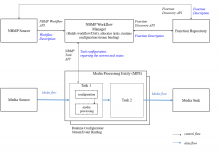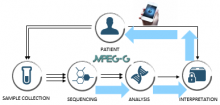This used to be the home page of MPEG, the group who developed an impressive portfolio of standards and technologies that have created an industry worth several hundreds billion USD. This page is kept as historical reference to MPEG achievements because the group I conceived in the summer of 1987, implemented in 1988, and guided for 32 years was closed on 2020/06/02.. Splinters using the word MPEG still exists.
This page is now used to communicate news about MPAI, the group the continues the MPEG spirit with the mission to develop standards for data coding by artificial intelligence with clear licencing frameworks. Here is the list of standards published so far:
|
AI Framework (MPAI-AIF) |
|||
|
Context-based Audio Enhancement (MPAI-CAE) |
|||
|
Connected Autonomous Vehicle (MPAI-CAV) – Architecture |
|||
|
Governance of the MPAI Ecosystem (MPAI-GME) |
|||
|
Human and Machine Communication (MPAI-HMC) |
|||
|
Multimodal Conversation (MPAI-MMC) |
|||
|
MPAI Metaverse Model (MPAI-MMM) - Architecture |
|||
|
Neural Network Watermarking MPAI-NNW) |
|||
|
Object and Scene Description (MPAI-OSD) |
|||
|
Portable Avatar Format (MPAI-PAF) |
MPAI – Moving Picture, Audio and Data Coding by Artificial Intelligence – believes that universally accessible standards can have the same positive effects on AI that standards wrought to digital media and has identified data coding as the area where standards can foster development of AI technologies, promote use of AI applications and contribute to the solution of existing problems. MPAI defines data coding as the transformation of data from a given representation to an equivalent one more suited to a specific application. Examples are compression and semantics extraction.
MPAI considers AI module (AIM) as the building block for AI-enabled applications. An AIM is defined by its function, and by the syntax and semantics of the data through its interfaces, not by how the function is performed. AIMs can be implemented in hardware or software, with AI or Machine Learning or legacy Data Processing.
MPAI’s AI framework enabling creation, execution, composition and update of AIM-based workflows (MPAI-AIF) is the cornerstone of MPAI standardisation because it enables building potentially complex AI solutions composed of interconnected multi-vendor AIMs trained to specific tasks, operating in the standard AI framework and exchanging data in standard formats.
Focusing on AI-based data coding will also allow MPAI to take advantage of the results of emerging and future research in representation learning, transfer learning, edge AI, and reproducibility of performance.
MPAI is mindful of IPR-related problems which have accompanied high-tech standardisation. Unlike standards developed by other bodies, which are based on sometimes vague and contention-prone patent declarations, MPAI standards are based on Framework Licences where IPR holders set out in advance IPR guidelines.
Finally, although it is a technical body, MPAI is aware of the revolutionary impact AI will have on the future of human society. MPAI pledges to address ethical questions raised by its technical work with the involvement of high-profile external thinkers. The initial significant step is to enable the understanding of the inner working of complex AI systems.
To join MPAI: follow instructions at https://mpai.community/community/join/
This page is kept as historical reference to MPEG achievements. In its 30 years of activity MPEG had developed an impressive portfolio of standards and technologies that have created an industry worth several hundreds billion USD.
In a world where information technology, consumer electronics, entertainment and telecommunication products and content variously converge by incorporating increasingly sophisticated technologies and the need for timely available standards is as strong as ever, MPEG used to provide a proven mechanism to bring research results into standards that promote innovation for the benefit of all.
This MPEG home page was kept up to date until 2020/06/06, the day the MPEG founder and convenor Leonardo Chiariglione resigned because the MPEG group was closed.




